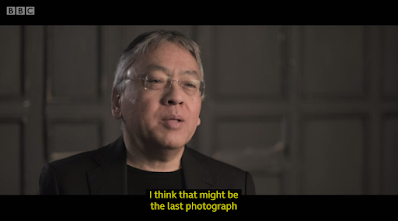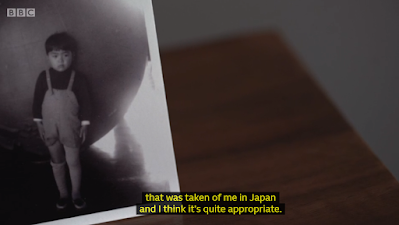10:00 We finish our boiled egg and toast breakfast - my god, we're late getting started today. We spent far too long in the shower and cleaning up afterwards. When will we ever learn?!!!
10:30 Suddenly we realise we have a load of letters and cards to post, and it takes us half an hour to get them ready, for some reason. Some have got to be weighed, including a birthday card going to the US, and then they must all be plastered with stamps, address labels and airmail stickers - what madness!!!!
We decide to go out and post them off, so we put them all in a bag for ease of carrying, and then take a walk over to the local football field, stopping at the post-box on the way round.
Lois posts our cards and letters in a typical local Royal Mail post-box:
Boris has announced some loosening of COVID lockdown restrictions starting from today, and it's interesting to see that many of the local old codgers are already taking advantage of this move to play some slow-motion tennis in the local tennis-courts adjoining the football field.
more freedom announced for taking part in outdoor sports
local old codgers take advantage of the easing of restrictions
to play slow-motion tennis in the courts adjoining the football field - what madness!!!!
Lois and I pass quickly by these "flannelled fools" and make for the Whiskers Coffee Stand, run by the local pub The Royal Oak, a pub which like all the others is currently closed till later next month. It's nice and peaceful around the stand now - until recently they were using their own noisy electricity generator, but now they're hooked up to the power supply in the nearby Parish Council office, which means that it's nice'n'quiet as we sip our drinks, which is a bit of a treat!
we enjoy a flat white coffee (me) and a hot chocolate (Lois)
together with half a flapjack each - yum yum!
13:00 We come home and have lunch. I dip into one of the books I got for my birthday, "The Horse, the Wheel and Language" by David W. Anthony.
I'm still only reading the first introductory pages, but Anthony is already letting slip an interesting fact - that people living in Northern Europe in ancient times (the Germanic tribes) were so scared of bears, that they couldn't bring themselves to say the proper word for them, which was something like the Latin word "ursus" (as in Ursa Major or Great Bear, the constellation etc) .
a typical bear, seen here in Finland
That's why the Germanic peoples referred to them as "bears", which originally just meant "the brown ones" - people are thought to have been afraid that if you said the proper word, a bear would be likely to suddenly appear round the corner or looking over your shoulder, a bit like your boss, except that, unlike your boss, it might actually kill you.
It's like people referring to the Devil as "the Evil One", in case he turns up at the wrong moment.
flashback to my birthday - I unwrap my gifts, including Anthony's book
(middle book of the three that I'm holding)
The Slavic peoples were also afraid they might meet a bear, so they called them by words that meant "the honey-eaters", for example "medved" in Russian and Czech. This form of euphemism has even been borrowed by Hungarian, which isn't even an Indo-European language, because the Hungarian word for bear is "medve" - they presumably borrowed that idea from the Slavs at some point.
The "medv-" part of this word (which means "honey" in English) is related to our word "mead", which is a strong drink made from fermented honey and water. Simples!!!!
The peoples of Southern Europe weren't so scared of bears, however - they figured they weren't likely to ever see one, which makes sense, so they carried on using the proper word.
Who knew that? [I expect a lot of people did - Ed]
Is the history of words not totally fascinating? Who would want to study anything else haha!
19:30 Lois disappears into the dining-room to take part in her sect's weekly Bible Seminar on zoom. I settle down on the couch and watch some TV, an interesting documentary in the "Imagine" series, all about Japanese-born writer Kazuo Ishiguro, who came to England as a young child of 5 years of age, and who has stayed here ever since.
Ishiguro was born in Nagasaki, but he moved to England as a small child, when his father got a job in Guildford, Surrey in 1960.
As a young man he hitchhiked across the States, hoping to become a singer-songwriter. He'd been inspired by Tom Jones's recording of "The Green Green Grass of Home", and although the failed in his ambitions at the time, he has dabbled in song-writing ever since.
What he likes about songs is that "they don't tell you everything - they leave some things to your imagination", and he carries this over into his novels, which are often described as "minimalist", or "elliptical".
In the 1980's he wrote the novel "An Artist of the Floating World", set in Japan in the late 1940's, which is all about an artist, now in old age, who is trying to understand his past, when, under pressure from the military regime, he had created a lot of art now considered unacceptable in the democratic post-war Japan.
Ishiguro says, however, that it wasn't meant to be a solely Japanese study - it was meant to apply to anybody in any country where values had changed - and there's plenty of that sort of thing going on nowadays, that's for sure!!!!
Poor Japanese artist !!! And as Ishiguro points out, the artist hadn't done anything very bad himself, compared with the regime he was working for. It was just the times he had lived in.
Fascinating stuff!
And also very nostalgic for me to see scenes of Nagasaki during Ishiguro's childhood. I visited the city in the summer of 1971, during my time as a student at Hitotsubashi University, Tokyo.
flashback to 1971 - me in Nagasaki
21:00 Lois emerges from her seminar and we watch one of our favourite TV quizzes, University Challenge, the student quiz.
This is the second semi-final and the teams, especially Magdalene, Cambridge, are top-notch. Lois and I have a miserable evening again - we get a fair proportion of the questions right, but there are only two that the students don't get right as well - damn!
1. Born in the Scottish borders in about 1265, which Franciscan friar and theologian was given the Latin epithet, Doctor Subtilis?
Students: Roger Bacon
Colin and Lois: Duns Scotus
2. We recognise the comedy pop group the Bonzo Dog Doo-Dah Band, singing their recording of "The Intro and the Outro", which the students misidentify as The Pet Shop Boys.
22:00 We go to bed - zzzzzzzzz!!!!!!




























No comments:
Post a Comment